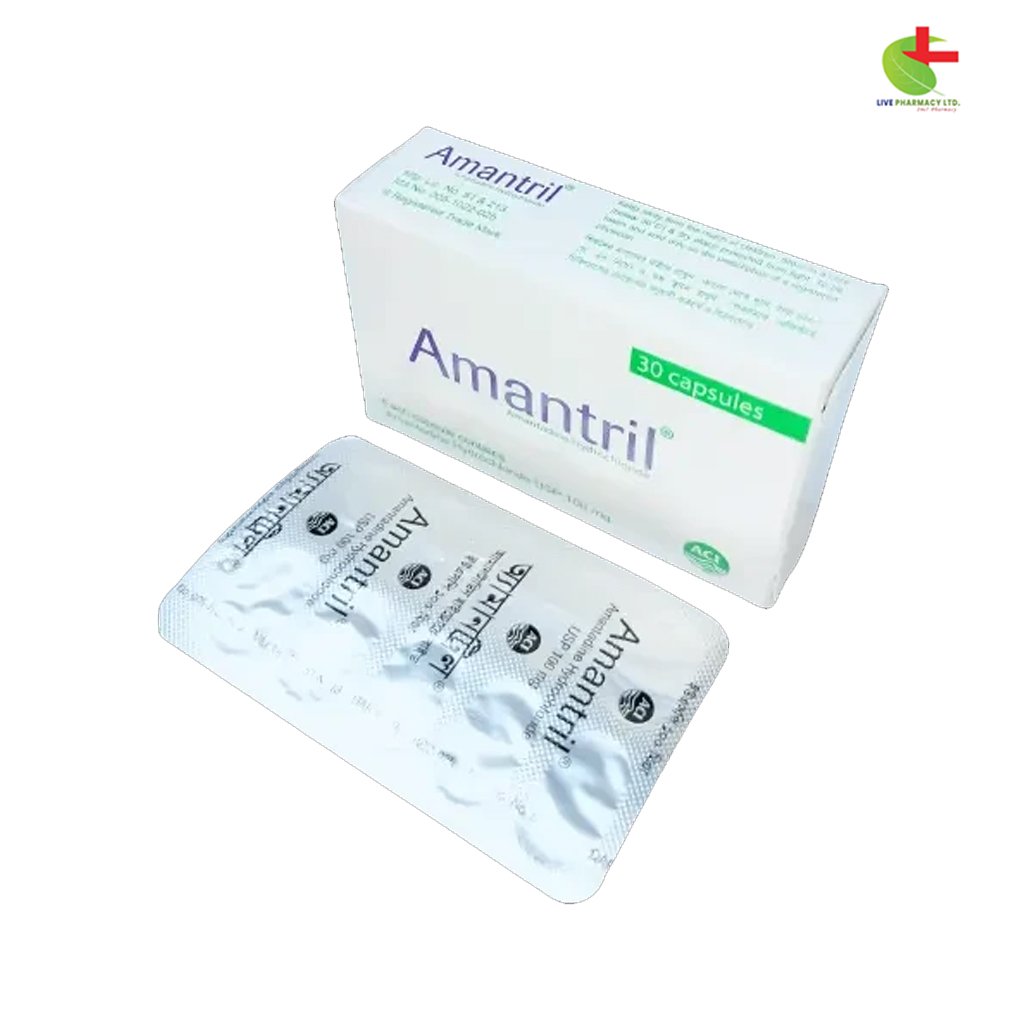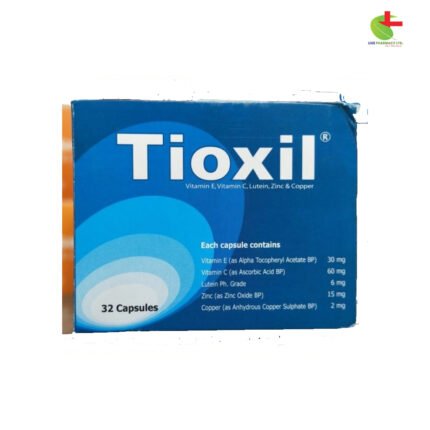Amantril 100
100.00৳ Strip
- Amantril is used to treat Parkinson’s disease, drug-induced extrapyramidal reactions, and influenza A infections.
- It works by enhancing dopamine release, blocking NMDA receptors, and modulating immune function.
- Available in oral form, typically prescribed under the supervision of a healthcare professional.
- Can be used alone or in combination with other therapies to improve symptoms and manage side effects.
- Always follow a doctor’s guidance for safe and effective use.
 Brand
Brand
|
ACI Limited |
|---|---|
 Generics
Generics
|
Amantadine Hydrochloride |
 Type
Type
|
Capsule |
Indications
Amantril is primarily indicated for:
- Parkinsonism Management: Effective for treating Parkinson’s disease symptoms.
- Extrapyramidal Reactions: Helps address drug-induced movement disorders.
- Influenza A Virus: Used both for prevention and treatment of infections caused by various strains of the influenza A virus.
Use under the supervision of a registered healthcare professional.
Pharmacology
Amantadine Hydrochloride acts on dopamine neurons in the brain, offering both direct and indirect effects. It enhances dopamine release from presynaptic neurons and inhibits its reuptake, while also directly interacting with dopamine receptors to upregulate D2 receptors, potentially due to receptor hypersensitivity. This action is beneficial in managing symptoms of Parkinson’s disease.
Antimuscarinic Properties: Amantadine has antimuscarinic effects that contribute to its therapeutic impact.
Antiglutamatergic Action: It also blocks NMDA receptors, which is helpful in reducing levodopa-induced dyskinesia. NMDA receptor sensitization may play a role in the development of such dyskinesias.
Immunomodulation: Amantadine can restore interleukin-2 (IL-2) production, which is often impaired in Parkinson’s patients.
Antiviral Mechanism: The exact mechanism for its antiviral activity is not fully understood, but Amantadine inhibits the release of viral nucleic acid within the host cell by disrupting the M2 protein function. It may also interfere with virus assembly, preventing replication.
Amantadine does not affect the effectiveness of inactivated influenza A vaccines.
Dosage & Administration
Parkinson’s Disease
- Adults: The typical starting dose is 100 mg twice daily when used alone.
- For patients with serious health conditions, the starting dose is 100 mg once daily, which can be gradually increased to 100 mg twice daily after 1-2 weeks.
- If 200 mg daily does not provide optimal relief, the dose may be increased to 400 mg per day in divided doses.
Combination Therapy: If Amantadine is used alongside other Parkinson’s medications (like levodopa or anticholinergic drugs), it may enhance therapeutic benefits and help reduce fluctuations in symptoms.
Drug-induced Extrapyramidal Reactions
- Adults: The typical dosage is 100 mg twice daily. For suboptimal response, the dose may be increased to 300 mg daily in divided doses.
Influenza A Virus (Prophylaxis and Treatment)
- Adults: The usual dose is 200 mg daily (as a single dose or 100 mg twice daily). If central nervous system side effects occur, consider splitting the dosage.
- Elderly (over 65 years): 100 mg daily.
- Children:
- 1 to 9 years: 4.4 to 8.8 mg/kg/day (not exceeding 150 mg/day).
- 9 to 12 years: 100 mg twice daily.
Method of Administration: Amantadine is taken orally, with or without food. Adjust doses for patients with renal or hepatic impairment.
Drug Interactions
Amantadine may interact with:
- Anticholinergic Agents or Levodopa: Increased risk of confusion, hallucinations, gastrointestinal issues, or other side effects.
- CNS-acting Drugs or Alcohol: The combination may lead to enhanced central nervous system toxicity, requiring close monitoring.
Contraindications
Amantadine is contraindicated for individuals with a known hypersensitivity to the active ingredient or any of the excipients.
Side Effects
Common side effects include:
- Mild Symptoms: Nausea, dizziness, insomnia.
- Other Possible Effects: Edema, livedo reticularis, anxiety, headache, hallucinations, ataxia, blurred vision, depression, dry mouth, and more.
Side effects generally diminish after continued use.
Pregnancy & Lactation
- Pregnancy: Category C. Amantadine may be prescribed during pregnancy if the potential benefits outweigh any possible risks.
- Breastfeeding: Amantadine is excreted in breast milk in small amounts. It should be used cautiously during breastfeeding due to a lack of data on its effects in infants.
Precautions & Warnings
- Do not abruptly discontinue Amantadine in Parkinson’s disease patients, as it may cause a sudden clinical deterioration (parkinsonian crisis).
- If combined with anticholinergic drugs, reduce the dose if atropine-like side effects occur.
- Be cautious with elderly patients and those with renal or liver issues.
Overdose Effects
Overdosing on Amantril can result in serious consequences, including:
- Central Nervous System: Anxiety, agitation, confusion, hallucinations, and in extreme cases, coma.
- Cardiovascular: Arrhythmia, tachycardia, and hypertension.
- Respiratory: Pulmonary edema and respiratory distress.
There is no specific antidote for overdose, but treatment may include intravenous physostigmine, supportive care, and the use of urine acidifiers to speed up elimination.
Therapeutic Class
- Category: Respiratory Viral Infections (Influenza)
Storage Conditions
Store in a cool, dry place away from light, and out of the reach of children.













Reviews
There are no reviews yet.